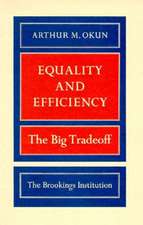Scarcity: The True Cost of Not Having Enough
Autor Sendhil Mullainathan, Eldar Shafiren Limba Engleză Paperback – 3 sep 2014
Why can we never seem to keep on top of our workload, social diary or chores? Why does poverty persist around the world? Why do successful people do things at the last minute in a sudden rush of energy? Here, economist Sendhil Mullainathan and psychologist Eldar Shafir reveal that the hidden side behind all these problems is that they're all about scarcity. Using the new science of scarcity, they explain why obesity is rampant; why people find it difficult to sleep when most sleep deprived; and why the lonely find it so hard to make friends. Scarcity will change the way you think about both the little everyday tasks and the big issues of global urgency.
'Stars in their respective disciplines, and the combination is greater than the sum of its parts. Their project has a unique feel to it: it is the finest combination of heart and head that I have seen in our field' - Daniel Kahneman, author of Thinking, Fast and Slow
'Scarcity is a captivating book, overflowing with new ideas, fantastic stories, and simple suggestions that just might change the way you live' - Steven D. Levitt, coauthor of Freakonomics
'An ultimately humane and very welcome book' - Oliver Burkeman, Guardian
Sendhil Mullainathan is a Professor of Economics at Harvard, and a recipient of a MacArthur Foundation "genius grant". He conducts research on development economics, behavioural economics, and corporate finance. He is Executive Director of Ideas 42, Institute of Quantitative Social Science, Harvard University.
Eldar Shafir is William Stewart Tod Professor of Psychology and Public Affairs at Princeton University. Most of his work focuses on descriptive analyses of inference, judgment, and decision making, and on issues related to behavioural economics.
| Toate formatele și edițiile | Preț | Express |
|---|---|---|
| Paperback (2) | 58.35 lei 23-34 zile | +20.79 lei 6-10 zile |
| Penguin Books – 3 sep 2014 | 58.35 lei 23-34 zile | +20.79 lei 6-10 zile |
| Picador USA – 3 noi 2014 | 101.90 lei 3-5 săpt. | +21.00 lei 6-10 zile |
Preț: 58.35 lei
Preț vechi: 69.70 lei
-16% Nou
11.17€ • 12.17$ • 9.41£
Carte disponibilă
Livrare economică 04-15 aprilie
Livrare express 18-22 martie pentru 30.78 lei
Specificații
ISBN-10: 0141049197
Pagini: 304
Dimensiuni: 129 x 198 x 17 mm
Greutate: 0.23 kg
Editura: Penguin Books
Colecția Penguin
Locul publicării:London, United Kingdom
Notă biografică
Sendhil Mullainathan is a Professor of Economics at Harvard, and a recipient of a MacArthur Foundation 'genius grant'. He conducts research on development economics, behavioural economics, and corporate finance. He is Executive Director of Ideas 42, Institute of Quantitative Social Science, Harvard University.
Eldar Shafir is William Stewart Tod Professor of Psychology and Public Affairs at Princeton University. Most of his work focuses on descriptive analyses of inference, judgement, and decision making, and on issues related to behavioural economics.
Recenzii
Scarcityis a captivating book, overflowing with new ideas, fantastic stories, and simple suggestions that just might change the way you live
Here is a winning recipe. Take a behavioral economist and a cognitive psychologist, each a prominent leader in his field, and let their creative minds commingle. What you get is a highly original and easily readable book that is full of intriguing insights. What does a single mom trying to make partner at a major law firm have in common with a peasant who spends half her income on interest payments? The answer is scarcity. Read this book to learn the surprising ways in which scarcity affects us all
An ultimately humane and very welcome book
The book's unified theory of the scarcity mentality is novel in its scope and ambition
A succinct, digestible and often delightfully witty introduction to an important new branch of economics
Descriere
Sendhil Mullainathan, the 'most interesting young economist in the world', and Eldar Shafir, the 'most brilliant psychologist' of his generation, explain the hidden problem behind everything with Scarcity
Why can we never seem to keep on top of our workload, social diary or chores? Why does poverty persist around the world? Why do successful people do things at the last minute in a sudden rush of energy? Here, economist Sendhil Mullainathan and psychologist Eldar Shafir reveal that the hidden side behind all these problems is that they're all about scarcity. Using the new science of scarcity, they explain why obesity is rampant; why people find it difficult to sleep when most sleep deprived; and why the lonely find it so hard to make friends. Scarcity will change the way you think about both the little everyday tasks and the big issues of global urgency.
'Stars in their respective disciplines, and the combination is greater than the sum of its parts. Their project has a unique feel to it: it is the finest combination of heart and head that I have seen in our field' - Daniel Kahneman, author of Thinking, Fast and Slow
'Scarcity is a captivating book, overflowing with new ideas, fantastic stories, and simple suggestions that just might change the way you live' - Steven D. Levitt, coauthor of Freakonomics
'An ultimately humane and very welcome book' - Oliver Burkeman, Guardian
Sendhil Mullainathan is a Professor of Economics at Harvard, and a recipient of a MacArthur Foundation "genius grant". He conducts research on development economics, behavioural economics, and corporate finance. He is Executive Director of Ideas 42, Institute of Quantitative Social Science, Harvard University.
Eldar Shafir is William Stewart Tod Professor of Psychology and Public Affairs at Princeton University. Most of his work focuses on descriptive analyses of inference, judgment, and decision making, and on issues related to behavioural economics.





















